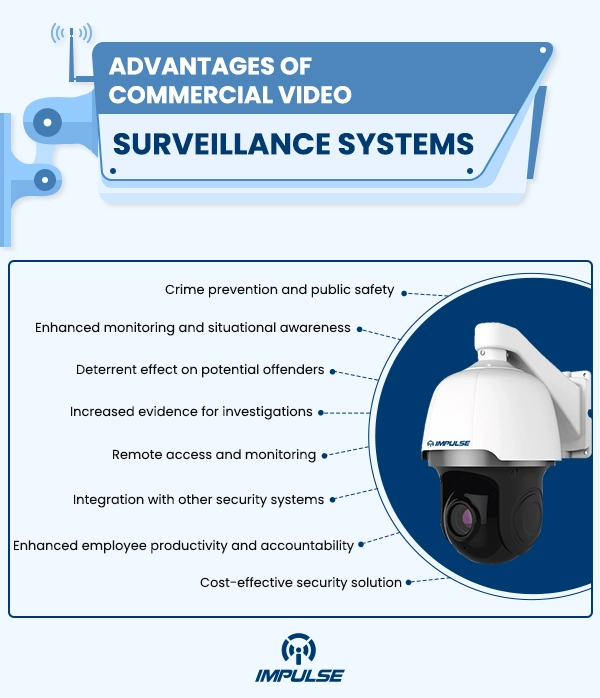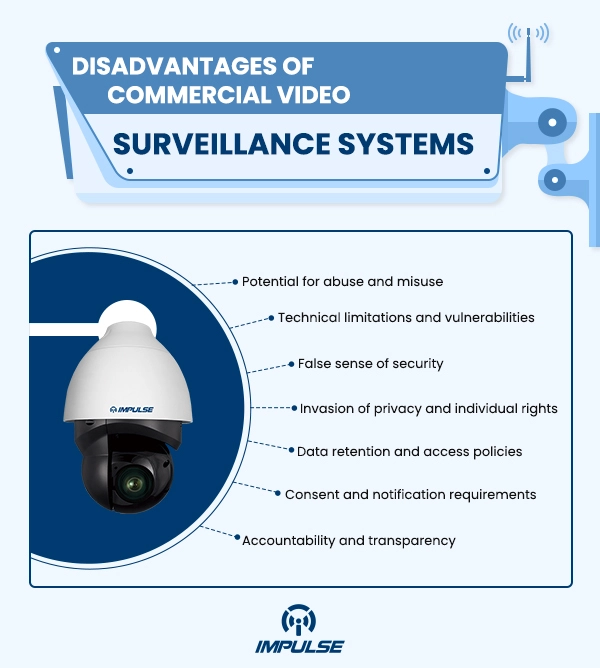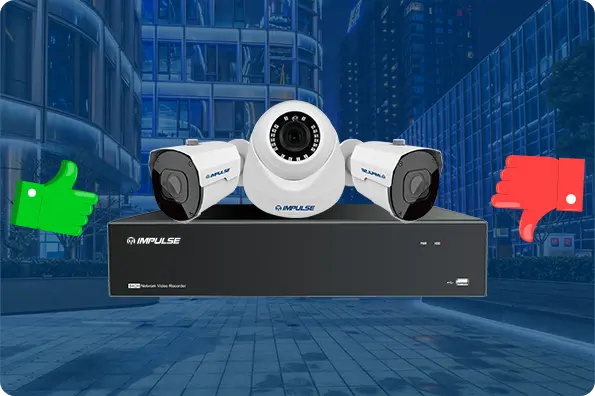Video surveillance systems have become an integral part of our ever-evolving technological landscape, shaping the way we monitor and secure our surroundings. As we step into the year 2024, it is crucial to assess the pros and cons of these systems, considering the advancements in technology and the implications on privacy and civil liberties. This article explores the benefits and drawbacks of video surveillance systems in 2024, delving into their impact on society, the advancements that have been made, legal and ethical considerations, and potential future applications. By understanding the multifaceted nature of commercial video surveillance systems, we can better comprehend their role and significance in both the present and the future.
Evolution of Commercial Video Surveillance Systems
Video surveillance systems have significantly evolved since the days of grainy black-and-white footage. In 2024, these systems have undergone remarkable advancements, offering high-quality, high-definition video that can be accessed remotely from anywhere. These commercial video surveillance systems, specifically designed for business use, have become more sophisticated and effective than ever before. With cutting-edge technology such as facial recognition and advanced analytics, these systems provide businesses with enhanced security and surveillance capabilities. Whether it is monitoring retail spaces, transportation hubs, or office premises, video surveillance cameras for business play a crucial role in ensuring the safety and security of both customers and employees. By leveraging the latest advancements in video surveillance technology, businesses can now have access to a comprehensive and reliable security solution that helps deter crime, monitor activities, and respond promptly to any potential threats.
Importance of Video Surveillance in Modern Society
Video surveillance plays a crucial role in maintaining public safety and security in our modern society. It helps prevent and deter crime, assists in investigations, and provides valuable evidence for law enforcement. Additionally, commercial video surveillance systems, are widely used in various industries such as retail, transportation, and hospitality to ensure smooth operations and protect both customers and employees. These business video surveillance systems provide an extra layer of security, allowing businesses to monitor their premises and detect any suspicious activities. By implementing video surveillance cameras for business, companies can enhance their security measures and create a safer environment for everyone involved.
Advantages of Video Surveillance Systems in 2024

2.1 Crime Prevention and Public Safety
One of the primary advantages of video surveillance systems is their ability to prevent and deter crime. With strategically placed video surveillance cameras for business, potential offenders are more likely to think twice before committing illegal activities. Knowing that their actions are being recorded and monitored can significantly reduce crime rates and enhance public safety.
2.2 Enhanced Monitoring and Situational Awareness
These business video surveillance systems offer enhanced monitoring capabilities, allowing users to keep a watchful eye on their surroundings. Whether it’s monitoring a large crowd or ensuring employee productivity, these systems provide real-time visual information that helps individuals make informed decisions and respond promptly to any situation.
2.3 Deterrent Effect on Potential Offenders
The presence of video surveillance cameras alone acts as a powerful deterrent to potential offenders. Many criminals reconsider their unlawful intentions when they notice these cameras. The fear of being caught on tape and facing the consequences acts as a significant deterrent, making video surveillance systems an effective tool for crime prevention.
3. Disadvantages of Video Surveillance Systems in 2024

3.1 Potential for Abuse and Misuse
While video surveillance systems offer numerous benefits, there is always the potential for abuse and misuse. It is crucial to ensure that business video surveillance cameras are used ethically and that the collected footage is stored securely. Without proper safeguards in place, commercial video surveillance systems can infringe upon people’s privacy rights and be exploited for nefarious purposes.
3.2 Technical Limitations and Vulnerabilities
Despite their advancements, video surveillance systems for business still have some technical limitations and vulnerabilities. Factors like poor lighting conditions or obscured views may hinder their effectiveness. Additionally, as with any interconnected technology, there is always the risk of cyberattacks and unauthorized access to the video surveillance system for business, which can compromise security and privacy.
3.3 False Sense of Security
While commercial video surveillance systems can provide valuable insights and evidence, it’s important to remember that they are not foolproof. Relying solely on these systems for security may create a false sense of security. They should be seen as one piece of a comprehensive security plan that includes other measures like trained personnel, access control systems, and alarm systems.
4. Impact of Video Surveillance on Privacy and Civil Liberties
4.1 Invasion of Privacy and Individual Rights
With the increasing prevalence of video surveillance, concerns about invasion of privacy and infringement on individual rights have become more prominent. People worry that their every move is being watched and recorded, eroding their sense of personal freedom. Striking a balance between ensuring public safety and respecting privacy rights is essential in the implementation and use of commercial video surveillance systems for businesses.
4.2 Balancing Security and Privacy Concerns
The challenge lies in striking a balance between security and privacy concerns. While video surveillance systems are undeniably valuable for crime prevention and investigations, measures must be in place to protect individual privacy. Clear guidelines on how video footage from business video surveillance cameras is collected, retained, and used, along with transparency in the deployment of surveillance cameras, can help address these concerns and maintain public trust in commercial video surveillance systems for businesses.
5. Technological Advancements in Video Surveillance Systems
5.1 Artificial Intelligence and Machine Learning Integration
In 2024, video surveillance systems have become smarter than ever thanks to the integration of artificial intelligence (AI) and machine learning. These technologies allow cameras to analyze and interpret video data in real time, enabling them to detect and respond to specific events or behaviors. For example, AI-powered systems can quickly identify suspicious activities, such as unauthorized access or potential threats, and alert security personnel. This advancement in technology has significantly enhanced the effectiveness and efficiency of commercial video surveillance systems.
5.2 High-Resolution Imagery and Advanced Sensors
Gone are the days of grainy and pixelated surveillance footage. With the advancement of commercial video surveillance cameras, video surveillance systems now capture crystal-clear visuals, allowing for better identification and analysis of events. These systems, specifically designed for businesses, can zoom in on specific areas or objects without losing image quality, offering comprehensive business video surveillance coverage. Advanced sensors also enable the detection of subtle movements or changes in the environment, improving the accuracy of threat detection.
5.3 Cloud Storage and Big Data Analytics
The use of cloud storage and big data analytics has revolutionized how video surveillance cameras for business footage is stored and analyzed. Instead of relying on physical storage devices, video data captured by commercial video surveillance systems can now be securely stored in the cloud, making it easily accessible from anywhere and reducing the risk of data loss. Additionally, big data analytics tools can process large volumes of video data to extract meaningful insights and patterns. This enables security personnel to proactively identify potential risks and improve overall decision-making in business video surveillance.
Impulse CCTV provides tailored video surveillance systems to meet your business needs. Take control of your security and protect what matters most.
6. Legal and Ethical Considerations of Commercial Video Surveillance Systems
6.1 Data Retention and Access Policies
While video surveillance systems offer numerous benefits, it is crucial to establish clear guidelines regarding data retention and access policies. Questions surrounding how long video footage from commercial video surveillance cameras should be stored and who has the authority to access it must be addressed. Striking a balance between maintaining public safety and respecting individual privacy is essential to ensure the responsible use of video surveillance technology for businesses.
6.2 Consent and Notification Requirements
The issue of consent and notification is another important consideration when it comes to commercial video surveillance cameras. Individuals should be informed and given the opportunity to provide consent when their activities are being recorded by video surveillance cameras for business. Clear sign and notifications in areas under surveillance can help maintain transparency and respect for privacy in business video surveillance.
6.3 Accountability and Transparency
Accountability and transparency are critical in maintaining public trust in commercial video surveillance cameras. Operators must adhere to strict ethical standards and ensure that the technology is being used for its intended purpose in business video surveillance. Regular audits and oversight can help mitigate the risk of misuse or abuse, ensuring that the benefits of video surveillance cameras for business outweigh any potential drawbacks.
7. Future Trends and Potential Applications of Video Surveillance Systems
7.1 Smart Cities and Internet of Things (IoT)
Video surveillance systems are poised to play a significant role in the development of smart cities. By integrating with the Internet of Things (IoT) devices and sensors, these systems can provide a comprehensive view of urban environments, enabling efficient traffic management, public safety enhancements, and improved resource allocation. The data collected by commercial video surveillance cameras can be analyzed to identify patterns and optimize various city operations.
7.2 Facial Recognition and Biometric Technology
The future of video surveillance systems also involves the integration of facial recognition and biometric technology. These advancements allow for quick and accurate identification of individuals, enhancing security measures in public spaces. Video surveillance cameras for business can utilize facial recognition and biometric technologies to track individuals of interest discreetly and effectively. However, concerns regarding privacy and potential misuse of such technology must be carefully addressed through ethical frameworks and legal regulations.
8. Conclusion
In conclusion, video surveillance systems have evolved significantly in 2024, driven by technological advancements and the need for enhanced security. With AI integration, high-resolution imagery, and cloud storage, these systems have become highly effective tools in identifying and responding to potential threats. Commercial video surveillance cameras have been instrumental in crime prevention, public safety, and monitoring, providing a sense of security to individuals and communities. However, it is important to address privacy concerns and technical limitations while embracing the benefits of surveillance technology. Striking a balance between security needs and the protection of civil liberties is crucial. With ongoing advancements in artificial intelligence, high-resolution imagery, and data analytics, the future of business video surveillance holds immense potential for creating safer and smarter environments.
FAQs about Commercial Video Surveillance Systems
1. Are video surveillance systems effective in preventing crime?
Commercial video surveillance cameras have shown to be effective in deterring potential offenders and aiding in the detection and investigation of crimes. The presence of cameras can act as a deterrent, making individuals think twice before engaging in illegal activities. Additionally, video footage can provide valuable evidence for law enforcement agencies, increasing the chances of apprehending criminals.
2. What are the potential privacy concerns associated with video surveillance cameras for business?
Privacy concerns arise due to the constant monitoring and recording of individuals’ activities in public spaces. There is a risk of abuse and misuse of surveillance footage, potential violations of privacy rights, and the creation of a surveillance state. Striking a balance between security needs and protecting individual privacy is essential, and robust legal and ethical frameworks should be in place to address these concerns.
3. How are video surveillance systems evolving technologically?
Video surveillance cameras for business have undergone significant advancements in recent years. The integration of artificial intelligence and machine learning enables advanced analytics, behavior recognition, and real-time monitoring. High-resolution imagery and advanced sensors improve the quality and accuracy of video footage. Cloud storage and big data analytics allow for efficient storage, analysis, and retrieval of vast amounts of surveillance data.
4. What are some potential future applications of commercial video surveillance systems?
The future of video surveillance systems holds tremendous potential for businesses. They can be integrated into smart cities and the Internet of Things (IoT), enabling seamless connectivity and enhanced security. Facial recognition and biometric technologies can help in identifying and tracking individuals of interest. Moreover, commercial video surveillance cameras can be utilized in conjunction with autonomous vehicles and robotics for various applications, such as traffic management and public safety.
5. How can Impulse CCTV help secure my business with commercial video surveillance systems?
Impulse CCTV offers comprehensive security solutions tailored to your business needs. With expertise in commercial video surveillance systems, Impulse CCTV can provide you with the right equipment and setup to enhance your business’s security. From high-resolution cameras to advanced analytics and remote monitoring capabilities, Impulse CCTV can help you take proactive measures to protect your assets and create a safe environment.
Choose Impulse CCTV for comprehensive security solutions tailored to your business needs. Take proactive measures to protect your assets and create a safe environment.


